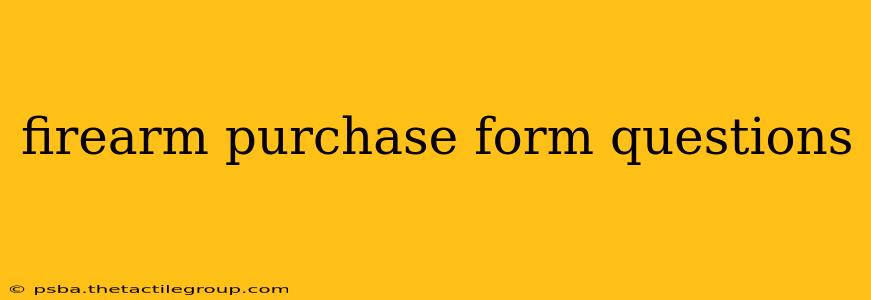Buying a firearm is a significant decision, and understanding the questions on the purchase form is crucial. This guide breaks down common questions found on firearm purchase forms, offering clarity and ensuring a smooth transaction. We'll explore the rationale behind these questions, highlighting their importance in responsible gun ownership and legal compliance.
Common Questions on Firearm Purchase Forms & Their Significance
Firearm purchase forms, often called 4473 forms (in the United States), are designed to ensure compliance with federal and state laws. The questions are intended to prevent firearms from falling into the wrong hands. While specific questions might vary slightly by state, the core elements remain consistent. Here's a breakdown:
Personal Information:
- Full Name: Verifies your identity and allows for accurate record-keeping. Misrepresenting this information is a serious federal offense.
- Date of Birth: Used to confirm your age and eligibility to purchase firearms. Federal law mandates you must be 18 for shotguns and rifles, and 21 for handguns. State laws may have stricter age restrictions.
- Address: Crucial for background checks and ensuring you receive any necessary correspondence. Providing an inaccurate address can significantly delay or prevent the purchase.
- Social Security Number (SSN): This is used for the National Instant Criminal Background Check System (NICS) check, a critical step in verifying your eligibility to own a firearm. The SSN helps confirm your identity and uncover any disqualifying criminal history or mental health records.
Legal and Eligibility Questions:
- Felony Convictions: Felons are generally prohibited from possessing firearms. This question is vital for preventing firearms from ending up in the hands of individuals with a history of violent crime.
- Domestic Violence Restraining Orders: Individuals subject to such orders are often prohibited from possessing firearms to protect potential victims.
- Mental Health Commitments: Individuals involuntarily committed to a mental institution may be restricted from firearm ownership to prevent potential harm to themselves or others.
- Drug Use: Illicit drug use can disqualify an individual from firearm ownership due to potential impairment and increased risk of violence.
- Dishonorable Discharge from the Military: This reflects a serious breach of military conduct and may indicate a pattern of behavior incompatible with responsible firearm ownership.
- Renunciation of Citizenship: This question is important because it can affect an individual's eligibility to possess firearms under various laws and regulations.
Firearm Information:
- Type of Firearm: This helps track the specific types of firearms being purchased and aids in analyzing sales trends for potential risk assessment.
- Make, Model, and Serial Number: These details are essential for tracing firearms if they are ever involved in a crime. Accurate recording ensures accountability and helps law enforcement investigations.
Understanding the Importance of Accurate Information
Providing false information on a firearm purchase form is a serious federal offense, carrying significant penalties including fines and imprisonment. Accuracy is paramount. If you are unsure about any question, it’s always best to consult with a legal professional or law enforcement before proceeding.
Beyond the Form: Responsible Gun Ownership
While completing the purchase form is a vital step, responsible gun ownership extends far beyond this process. Safe storage, proper training, and a deep understanding of firearm safety are equally critical components of responsible gun ownership.
This information is for educational purposes only and should not be considered legal advice. Always consult with legal professionals and relevant authorities for accurate and up-to-date guidance on firearm laws in your specific jurisdiction.

